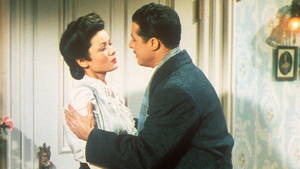Ernst Lubitsch’s Heaven Can Wait (1943) is, by all appearances, a stuffy period piece—a comedy of manners. Yet, to take the film at surface value misses the ways that Lubitsch gleefully pokes holes in the era’s overblown pomp. The film focuses on Henry Van Cleve (Don Ameche), an aged philanderer who has just died. Instead of passing on, either to Heaven or, as Henry assumes, Hell, he ends up relating the story of his life and the women in it to His Excellency (Laird Cregar), the debauched Devil who lasciviously grins and leans in as Henry begins his account.
The film quickly moves from his mother, to his nurse, to a little girl he knew, to the family’s French maid. From each, Henry learns valuable lessons, whether that lesson is an increased cynicism about the compliments he is paid, or that if you like a girl you have to give something away. Sex, while not explicit, is present in each of these occasions: the mother gave birth to Henry for a reason, the nurse abandons the baby carriage for an excursion with her lover, the little girl takes not just one of Henry’s beetles but both, so that they can be together, and the French maid and Henry’s drunken revel, and perhaps more, are exposed by their shared hiccups. Despite enforced decorum, repressed sexual energy reveals itself in the conscious and unconscious actions of the characters, threatening to escape their bodies as a hiccup or, as we later see, a sneeze.
After this brief introduction to Henry and the world he lives in, the rest of the film centers on the relationship between Henry and Martha Strabel (Gene Tierney). Henry first sees her in the street and pretends to be a clerk in the bookstore she enters, helping her find the book she is looking for, How to Make Your Husband Happy. They later meet again at Henry’s house, where it is revealed that she is engaged to his stuffy cousin Albert (Allyn Joslyn). Later that night, during a performance in the parlor, Albert, always the polite one, tells Martha to leave the room if she is going to keep sneezing and disrupting the music. She heads into an adjacent room, only to find that Henry is already in it, avoiding the performance for reasons of his own. They talk, they kiss, they talk some more, and then they leave the room and run away to get married. But not before Martha’s sneeze betrays the affair to all of the guests. While the rest of the family is appalled, Henry’s grandfather Hugo (Charles Coburn) supports them, as he always does, sending money for their honeymoon rather than stern words and disavowals.
Their marriage has its ups and downs, separations and reunions, but they love each other throughout. To an unseen degree, Henry continues his old affairs, although they become less successful as he gets older. How sublime then is the scene of Henry’s jealousy in the room where they met, as he asks Martha again and again who she was talking to on the phone. She responds with, instead of consternation, teasing joy that finally Henry is the one jealous of her. As it turns out, she had been talking to her doctor, but she assures Henry that her illness is nothing serious. A gentle lie, told out of love; she dies soon after.
The story goes on, but Henry is not the same without Martha. And, years later, he blissfully dies as a young nurse takes care of him. After the tale, Henry willingly expects to go to Hell, content with the life he has led. But the afterlife has other things in store for him. In the end, he gets in to Heaven—reunited with his loved ones—not because he has lived perfectly but because he has lived (and loved) fully.
Author Biography
Adam Reece is a senior at Hendrix College majoring in English-Literary Studies. He recently received the “Kenneth Story Best Senior Thesis Award” for his work on Herman Melville’s Bartleby, the Scrivener, and will be graduating with distinction.
Mentor Biography
Kristi McKim is an Associate Professor of English and Chair of Film Studies at Hendrix College, where she was awarded the Charles S. and Lucile Esmon Shivley Odyssey Professorship, honored as the 2014-15 United Methodist Exemplary Professor, and nominated for the CASE U.S. Professors of the Year Award. Her publications include the books Love in the Time of Cinema (2011) and Cinema as Weather: Stylistic Screens and Atmospheric Change (2013), in addition to pieces in Camera Obscura, Studies in French Cinema, Senses of Cinema, Film International, The Cine-Files, and Film-Philosophy.
Department Overview
Hendrix College offers a major in English with an emphasis in Film Studies and a minor in Film Studies. This growing program within an intimate and rigorous liberal arts college environment includes a variety of courses in the history and theory of film and media, alongside co-curricular experiences (such as this trip to the New York Film Festival) generously made possible through the Hendrix-Odyssey Program. Extracurricular film-related groups include Hendrix Film Society and Hendrix Filmmakers.
Film Details
Heaven Can Wait (1943)
USA
Director Ernst Lubitsch
Runtime 112 minutes
Follow this link to read the introduction to this set of reviews: https://www.filmmattersmagazine.com/2016/05/21/2015-new-york-film-festival-introduction/








































